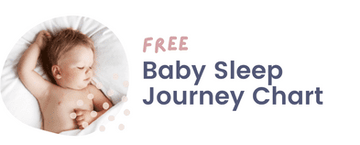
The problem with 5 AM...
5 - 6 AM is not considered morning in my house. You're with me right?! This is a horrible time of the night to get dragged out of bed yet it is such a common wake up time for many babies and pre schoolers.
Whyyyyyy?!
Well, it's all down to 2 things - sleep hormones and sleep cycles.
As a baby nears bedtime in the evening, they start to experience a rise in melatonin levels. Melatonin is a sleep hormone that is released mostly in the dark and is responsible for us falling asleep and staying asleep. It governs our night-time sleep cycles (which are longer than daytime sleep cycles) and differentiates night sleep from day sleep in our brains. Traditionally speaking, before we were able to prolong daylight via electric lights, as dusk approached our bodies would have started to release this hormone, making us sleepy leading up to bedtime. Melatonin is only produced in the dark. This is still why the natural, biological bedtime for babies and children tends to be between 6:30-7:30 PM - just after dusk. During summer months when the sun sets a lot later, many babies and young children struggle to settle and sleep if their room is still too sunny and bright - it is a case of the sleep hormones not being produced to tell them its time for night-time sleep. We can get around this by creating a false night with blackout blinds.
Feeling confused about your baby's sleep needs?
Let our sleep experts help you every step of the way. Together we can solve your little one's sleep challenges
Choose your Sleep Solution
Once asleep, the melatonin continues to rise in our bodies until midnight. This is why the period between bedtime and midnight is considered the most restorative sleep and is when we sleep the deepest - we are being pumped full of those good sleep hormones. After midnight the melatonin drops off, which can mean many babies sleep well up until midnight then wake every 2 hours beyond that (especially if they can't self-settle). By 5 AM the melatonin has pretty much gone out of our systems. This is the end of our night-time sleep cycles and we enter a period of light sleep rather than the deep sleep we were in previously.
So, what does all this mean for the dreaded 5 AM wake? Well... once your baby comes out of their night-time sleep cycles and the melatonin is wearing thin (around 5 AM), it will be MUCH harder for them to stay asleep if any little thing is troubling them. As your baby naturally rouses at this time, if they are slightly hungry, a tad too cold, uncomfortable, have a sore throat/ears/tummy or can hear stimulating noises they won't want to go back to sleep.
If your baby has already had enough sleep from having had too much day sleep the day before, they won't want to go back to sleep.
If your baby was overtired at bedtime, meaning the stress hormone cortisol is still in their system (this hormone works just like caffeine), they won't want to go back to sleep.
If your baby's morning nap is too early in the day or for too long they learn that they need to be awake for longer in the lead-up to this nap, so at 5 AM they won't want to go back to sleep.
If there is any light coming into their room during this 5 AM change in their cycles it will signal morning to your baby and, you guessed it, they won't want to go back to sleep!
This is the problem with 5 AM. It is a time where we all enter a lighter sleep so it is a very sensitive and delicate time for your baby.
Watch: How do I stop my baby waking early?
Taking measures to rule out the factors listed above is your best line of defence against that pesky early morning wake. A repeated wake at 5 AM for babies beyond 6 months can easily turn into a habit, resetting their circadian rhythms, which can honestly take a VERY long time to correct.
___________
References:
Nakagawa, M. et al. Daytime nap controls toddlers’ nighttime sleep. Sci. Rep. 6, 27246; doi: 10.1038/srep27246 (2016).
Coons S, Guilleminault C. Development of consolidated sleep and wakeful periods in relation to the day/night cycle in infancy. Dev Med Child Neurol. 1984 Apr;26(2):169-76. PubMed PMID: 6724155.
Coons S, Guilleminault C. Development of sleep-wake patterns and non-rapid eye movement sleep stages during the first six months of life in normal infants. Pediatrics. 1982 Jun;69(6):793-8. PubMed PMID: 7079046.
Dewar, G. (2008-2014). Baby sleep patterns: A guide for the science-minded. Retrieved from Parenting Science: http:// www.parentingscience.com/baby-sleep-patterns.html
de Weerth, C., R.H. Zijl, and J.K. Buitelaar. Development of cortisol circadian rhythm in infancy. Early Hum Dev. 73(1-2): p. 39-52. 2003.

Receive product and services updates, promotional offers and other marketing communications based.





